Our beloved Fraser River is, in my view, the mother of Delta's fishing heritage. The Fraser River has a very interesting history and, of course, the river's history is intertwined with Delta's history.
The Fraser River estuary has evolved over the last 10,000 years, since the last Ice Age. In this time, a rich flood plain has formed , which in turn has become habitat for an amazing array of lifeforms, both flora and fauna.
The earliest evidence of local human habitation is at the Glenrose Cannery site, and is 9,000 years old. The Fraser's mouth was located around the Glenrose site at that time.
At the time of European contact, the Fraser River was a force to be reckoned with. The estuary was a huge flood plain with a series of channels that were altered by annual spring freshets.
The creation of dikes throughout the Fraser Valley stabilized the main channels of the Fraser River. At that time the deepest channel of the Fraser's South Arm flowed past Port Guichon and seaward through
Canoe Pass. Port Guichon became a deep sea port, and the current at maximum ebb formed large whirlpools just above the Westham Island Bridge.
All of that began to change around 1950 with a series of trifurcation projects being built to divert the South Arm channel to Steveston Channel. A rock wall was laid along the upper end of Kirkland Island and the upper end of Deas Slough was blocked permanently. All of Ladner Reach and Canoe Pass have been heavily silted since then. The river was altered to accommodate shipping.
In its history the Fraser River has also been altered by pollution and resource extraction, such as mining and logging in its watershed. However, our society has been somewhat successful in mitigating these threats by enacting laws to prevent pollution, building sewage treatment plants and improving logging practises.
There is no doubt that Fraser River salmon runs have been affected negatively by human activity, but we can change that. Deltans, like most Canadians, are more environmentally aware than ever.
One of the projects of the Delta Fishing Heritage Society is the creation of a Fraser River Estuary Interpretive Centre, which would provide education about the history and importance of the estuary, and the need to maintain its natural state.
In terms of food security, we should strive to maximize the Fraser River estuary's full potential to produce food from the land and waters.
To me, fishing heritage is all about preserving our history in a way that educates and informs us about the past so we clearly understand the present and are able to plan for the future needs of our society.
Healthy fish stocks would be a great achievement.
In closing, I would invite everyone to attend the Delta Fishing Heritage Society's rescheduled Salmon Dinner and Concert, set for Saturday, Feb.13 at the Ladner Fishermen's' Co-op Hall at 6 p.m. Tickets are $30 and are available at Angela's Boutique or by calling me at 604-946-9902.
John Stevens is president of the Delta Fishing Heritage Society.



